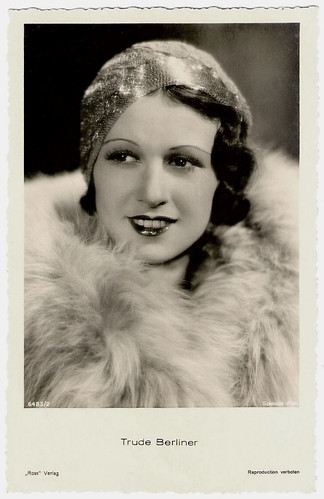
German postcard by Ross Verlag, no. 6483/2, 1931-1932. Photo: Splendid-Film.
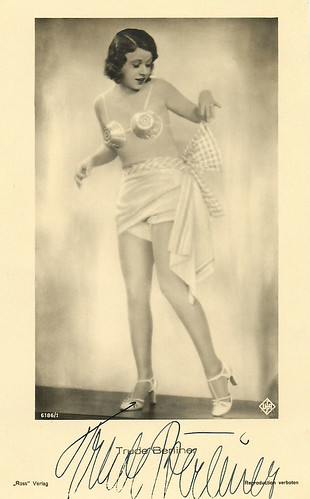
German postcard by Ross Verlag, no. 6186/1, 1931-1932. Photo: Ufa. Collection: Didier Hanson.

German postcard by Ross Verlag, no. 7754/1, 1932-1933. Photo: Ufa.
Perky and bubbly
Gertrude Berliner was born in Berlin, Germany, in 1903. She attended ballet and acting lessons. Her first stage role was in the play 'Der fidele Bauer' (The Jolly Farmer), and at 13, she already played her first film part as a child in Adamants letztes Rennen / Adamants Last Race (Max Mack, 1916) with Maria Orska.
After WWI, Trude became a famous cabaret performer in Berlin, who performed in music halls and at the Scala. She also played on stage in operettas and comedies. In 1924, she appeared in her next silent film, Der geheime Agent / The Secret Agent (Erich Schönfelder, 1924), starring Eva May. It was followed by Krieg im Frieden / War in Peace (Carl Boese, 1925).
Berliner had to wait four more years before her film career really would take off. In 1929, she appeared in Dich hab ich geliebt / It's You I Have Loved (Rudolf Walther-Fein, 1929), starring Mady Christians and Hans Stüwe. It would become the first German talkie released in the United States. That same year, she was the leading lady opposite Karl Ludwig Diehl as detective Stuart Webb in the silent film Masken / Masks (Rudolf Meinert, 1929). She played a typical Berlin girl: perky and bubbly.
Berliner appeared in several well-known German films during the 1930s. These included Ich heirate meinen Mann / Her Wedding Night (E.W. Emo, 1931), Der Hochtourist / The High Tourist (Alfred Zeisler, 1931), Die unsichtbare Front / The Invisible Front (Richard Eichberg, 1932), Grossstadtnacht / Big city night (Fedor Ozep, 1932) and Kaiserwalzer / The Emperor's Waltz (Friedrich Zelnik, 1932).
She had a small part in the Heinz Rühmann comedy Der Stolz der 3. Kompanie / The Pride of Company Three (Fred Sauer, 1932). Also interesting was the drama Nachtkolonne / Night Watch (James Bauer, 1932), with Vladimir Gajdarov and Olga Tschechowa. Es war einmal ein Musikus / There was once a Musician (Friedrich Zelnik, 1933) was her last film in Germany. It also featured S.Z. Sakall, and was the fourth German film in which Berliner and Sakall appeared together.
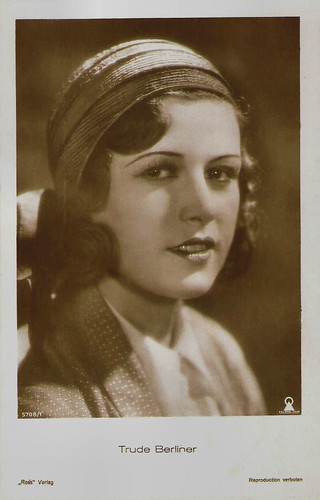
German postcard by Ross Verlag, no. 5708/1, 1930-1931. Photo: Felsom Film. Publicity still for Drei Tage Liebe / Three Days of Love (Heinz Hilpert, 1931).
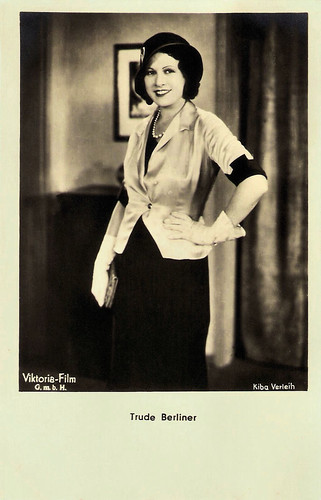
Austrian postcard by Iris-Verlag, no. 6211. Photo: Viktoria-Film / Kiba Verleih.
Casablanca
Being Jewish, Trude Berliner left Germany when Hitler and the Nazi Party came to power. In 1933, she travelled over Prague, Vienna and Paris to the Netherlands. Here she worked among other things in Willy Rosen's cabaret Das Theater der Prominenten (Theatre of Celebrities). In 1939, Berliner married the Swiss-born painter Max Schoop. In 1940, the Wehrmacht invaded the Netherlands, and Trude fled with her husband over Lisbon to the United States. She worked in a cabaret in New York, but in Hollywood, Berliner was not able to continue her film career. She received only bit roles in four movies.
In 1942, Berliner received her first American film part in the legendary romantic drama Casablanca (Michael Curtiz, 1942) with Humphrey Bogart and Ingrid Bergman. Berliner portrayed a woman playing baccarat with a Dutch banker (played by Torben Meyer). In her one line in the movie, she says to the waiter Carl (S.Z. Sakall), "Will you ask Rick if he will have a drink with us?", to which Carl responds, "Madame, he never drinks with customers. Never. I have never seen it."
Later that year, she had another bit part in the World War II romance Reunion in France (Jules Dassin, 1942) starring John Wayne, Joan Crawford and Philip Dorn (a.k.a. Frits van Dongen). The following year, Berliner played Frau Reitler in The Strange Death of Adolf Hitler (James P. Hogan, 1943). The film follows a man who plans to murder Adolf Hitler and steal his identity.
Her last film appearance was a small uncredited role as a German actress in the Technicolour musical The Dolly Sisters (Irving, 1945) starring Betty Grable, June Haver and S.Z. Sakall. This is a biographical film about the Dolly Sisters, identical twins who became famous as entertainers on Broadway and in Europe in the early years of the twentieth century.
In order to earn a living, Berliner worked among others in the pottery of the also emigrated actor Ernst Verebes and administered a date farm. In 1955, she returned to Berlin and was seen again in the German film Vor Gott und den Menschen / Before God and man (Erich Engel, 1955) with Antje Weisgerber and Hans Söhnker. After that, Trude Berliner lived quietly in California until she died in 1977 in San Diego, just two days shy of her 74th birthday.
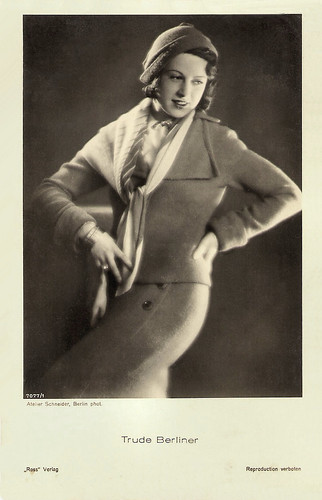
German postcard by Ross Verlag, no. 7077/1, 1932-1933. Photo: Atelier Schneider, Berlin.

German postcard by Ross Verlag, no. 8722/1, 1933-1934. Photo: Pierre Saaf, Amsterdam.
Sources: Thomas Staedeli (Cyranos.ch), Filmportal.de, Wikipedia (English and German) and IMDb.
This post was last updated on 25 August 2025.
No comments:
Post a Comment